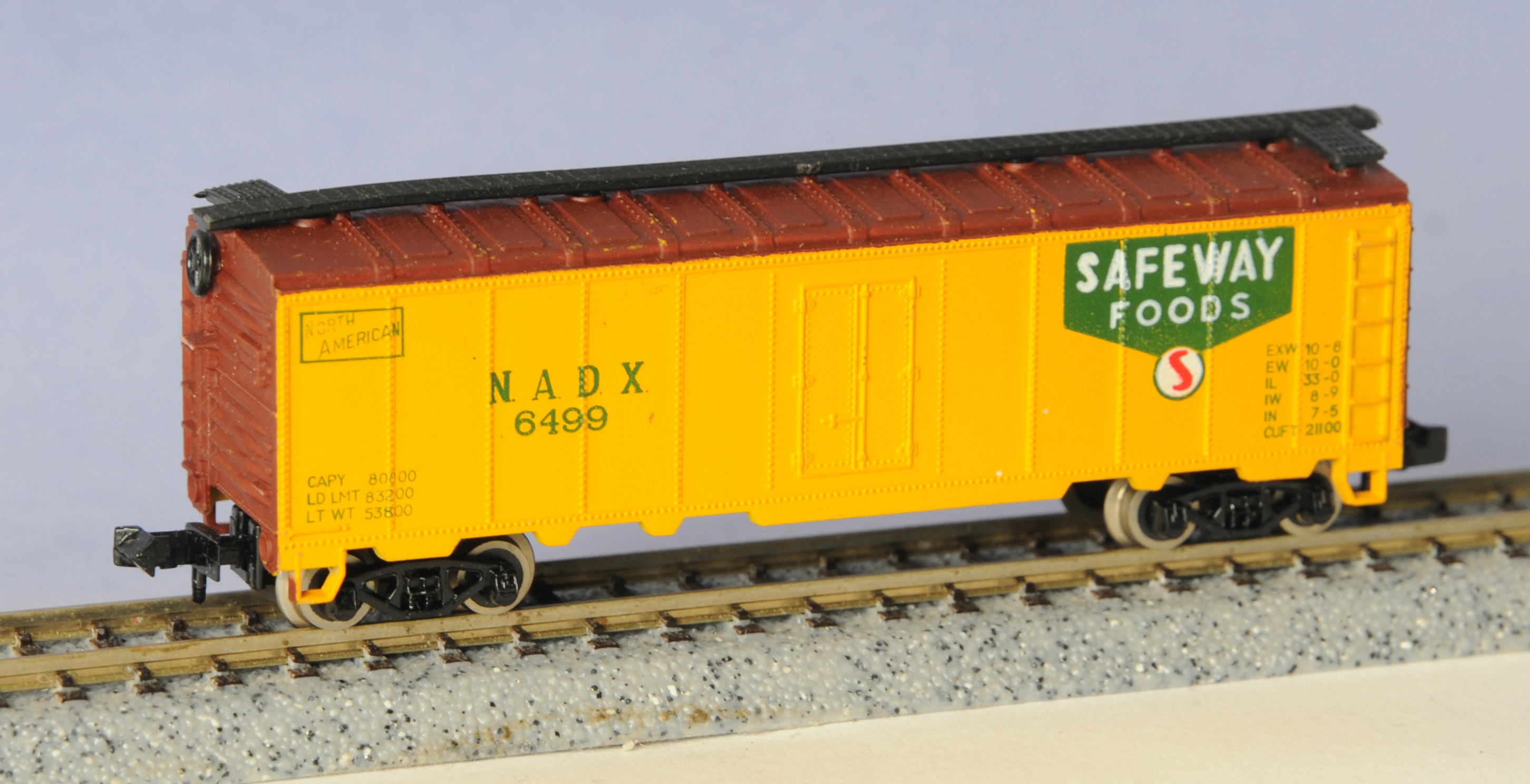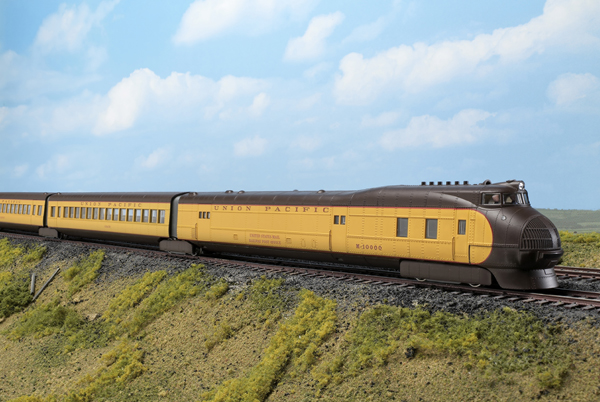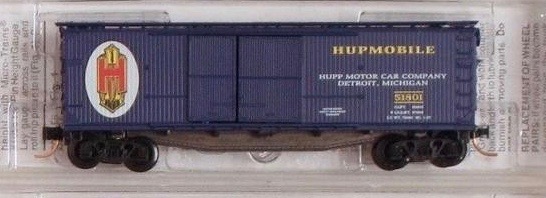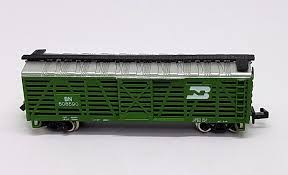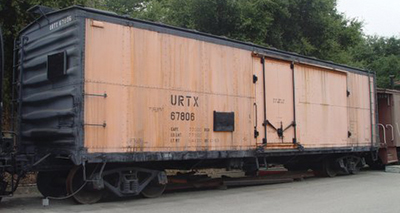Model Information: Mehano first started producing this model in the early 1970's for MRC. It is clearly a knock-off of the Roco 40 foot steel reefer of the same time period. Even the under-frames are close to identical! The only simple way to tell the difference between the Roco and Mehano versions are whether they say "Yugoslavia" or "Austria" on the underframe. I am unsure whether the tooling was licensed by Mehano or 'stolen'. The Mehano version was also imported by AHM and Model Power. Later, the tooling became lost or damaged (due to the civil war in Yugoslavia) and Mehano redid the model to carry a more conventional plug door. The new version was imported only by Life-Like.
Prototype History: A refrigerator car (or “reefer”) is a refrigerated boxcar (US) or van (UIC), a piece of railroad rolling stock designed to carry perishable freight at specific temperatures. Refrigerator cars differ from simple insulated boxcars and ventilated boxcars (commonly used for transporting fruit), neither of which are fitted with cooling apparatus. Reefers can be ice-cooled, come equipped with any one of a variety of mechanical refrigeration systems, or utilize carbon dioxide (either as dry ice, or in liquid form) as a cooling agent. Milk cars (and other types of “express” reefers) may or may not include a cooling system, but are equipped with high-speed trucks and other modifications that allow them to travel with passenger trains.
By the 1940's, new reefers were being built entirely of steel. Insulating techniques improved to the point where economical refrigeration could be accomplished using steel side plates in place of wood sheathing. Cars with steel roofs and sides were more durable and required fewer repairs.
The General American Transportation Corporation built several 40' steel reefer for the Union Refrigerator Transit Line (URTX) from the late 1940's into the 1950's.
This reefer was 40' long & weighted 61,500 lbs. The car is a steel bodied reefer with iced bunkers at each end. These ice bunkers hold 10,400 lbs. of chunk ice or 11,500 lbs. of crushed ice. Ice stations were located every 100-150 miles along the railroads main line to replace the melted ice. In the winter, charcoal heaters could be placed in the bunkers to keep the cargo from freezing. Fans are located in the floor at each end to circulate air and keep an even temperature throughout the car. Typical cargo would be fresh fruit, vegetables or eggs.
American Car & Foundry (ACF Industries) also built 40' reefer for several companies.
By the 1940's, new reefers were being built entirely of steel. Insulating techniques improved to the point where economical refrigeration could be accomplished using steel side plates in place of wood sheathing. Cars with steel roofs and sides were more durable and required fewer repairs.
The General American Transportation Corporation built several 40' steel reefer for the Union Refrigerator Transit Line (URTX) from the late 1940's into the 1950's.
This reefer was 40' long & weighted 61,500 lbs. The car is a steel bodied reefer with iced bunkers at each end. These ice bunkers hold 10,400 lbs. of chunk ice or 11,500 lbs. of crushed ice. Ice stations were located every 100-150 miles along the railroads main line to replace the melted ice. In the winter, charcoal heaters could be placed in the bunkers to keep the cargo from freezing. Fans are located in the floor at each end to circulate air and keep an even temperature throughout the car. Typical cargo would be fresh fruit, vegetables or eggs.
American Car & Foundry (ACF Industries) also built 40' reefer for several companies.
Road Name History: 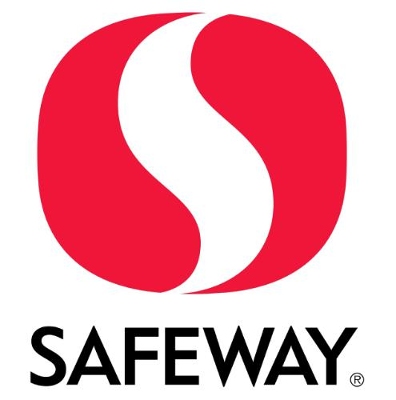 Safeway, Inc., is an American supermarket chain founded in 1915. It is a subsidiary of Albertsons after being acquired by private equity investors led by Cerberus Capital Management in January 2015. Safeway's primary base of operations is in the western and central United States, with some stores located in the Mid-Atlantic region of the Eastern Seaboard. The subsidiary is headquartered in Pleasanton, Alameda County, California, with its parent company headquartered in Boise, Idaho.
Safeway, Inc., is an American supermarket chain founded in 1915. It is a subsidiary of Albertsons after being acquired by private equity investors led by Cerberus Capital Management in January 2015. Safeway's primary base of operations is in the western and central United States, with some stores located in the Mid-Atlantic region of the Eastern Seaboard. The subsidiary is headquartered in Pleasanton, Alameda County, California, with its parent company headquartered in Boise, Idaho.
Safeway stores operate under the logo of a stylized white "S" inside a rounded red square with the slogan "Ingredients for life". Following the organics trend, the stores have expanded the number of organic fruits and vegetables in the produce section and offer other items under the "O Organics" label. Stores may have a deli counter, a meat department, a produce section, a flower department, a bakery, a pharmacy, a liquor section, and/or many aisles of nonperishable items. The stores offer many in-house private label brands as well as name brands across all product categories.
From Wikipedia

Safeway stores operate under the logo of a stylized white "S" inside a rounded red square with the slogan "Ingredients for life". Following the organics trend, the stores have expanded the number of organic fruits and vegetables in the produce section and offer other items under the "O Organics" label. Stores may have a deli counter, a meat department, a produce section, a flower department, a bakery, a pharmacy, a liquor section, and/or many aisles of nonperishable items. The stores offer many in-house private label brands as well as name brands across all product categories.
From Wikipedia
Brand/Importer Information: 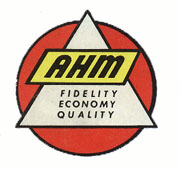 AHM is the initials for Associated Hobby Manufacturers, Inc. The company was founded in 1959 as a reseller of other companies' model railroad components. Initially an HO company, they entered into N Scale in the early 1970's as an importer of products made by Roco in Austria. For N Scale products, AHM apparently contracted to use the exact same molds as were used by Roco to produce early Atlas models. They also contracted with Rivarossi to make locomotives.
AHM is the initials for Associated Hobby Manufacturers, Inc. The company was founded in 1959 as a reseller of other companies' model railroad components. Initially an HO company, they entered into N Scale in the early 1970's as an importer of products made by Roco in Austria. For N Scale products, AHM apparently contracted to use the exact same molds as were used by Roco to produce early Atlas models. They also contracted with Rivarossi to make locomotives.
When AHM went out of business IHC picked up some of their line. Also, at least one body style was taken over by Eastern Seaboard models.

When AHM went out of business IHC picked up some of their line. Also, at least one body style was taken over by Eastern Seaboard models.
Manufacturer Information: Mehano is a Slovenian toy manufacturer located in Izola, Slovenija. The company was founded as Mehanotehnika and was producing toys starting in June 1953. They first exhibited at the Nuerenberg Toy Fair in 1959. Mehano produced a number of different locomotives and rolling stock models for the North American market in the 1960s and 1970s. Companies such as Atlas and Life-Like imported a huge variety of their products. Generally they can easily be recognized as they are stamped "Yugosolavia" on the underframe. The company was formally renamed "Mehano" in 1990. Izola today is part of the country of Slovenia since the breakup of Yugoslavia.
Mehano filed for bankruptcy in 2008, but still continued to exist and operate. Since 2012, Mehano products are distributed by Lemke.
Mehano filed for bankruptcy in 2008, but still continued to exist and operate. Since 2012, Mehano products are distributed by Lemke.
Item created by: gdm on 2017-03-21 20:36:52. Last edited by gdm on 2021-02-25 16:51:54
If you see errors or missing data in this entry, please feel free to log in and edit it. Anyone with a Gmail account can log in instantly.
If you see errors or missing data in this entry, please feel free to log in and edit it. Anyone with a Gmail account can log in instantly.


